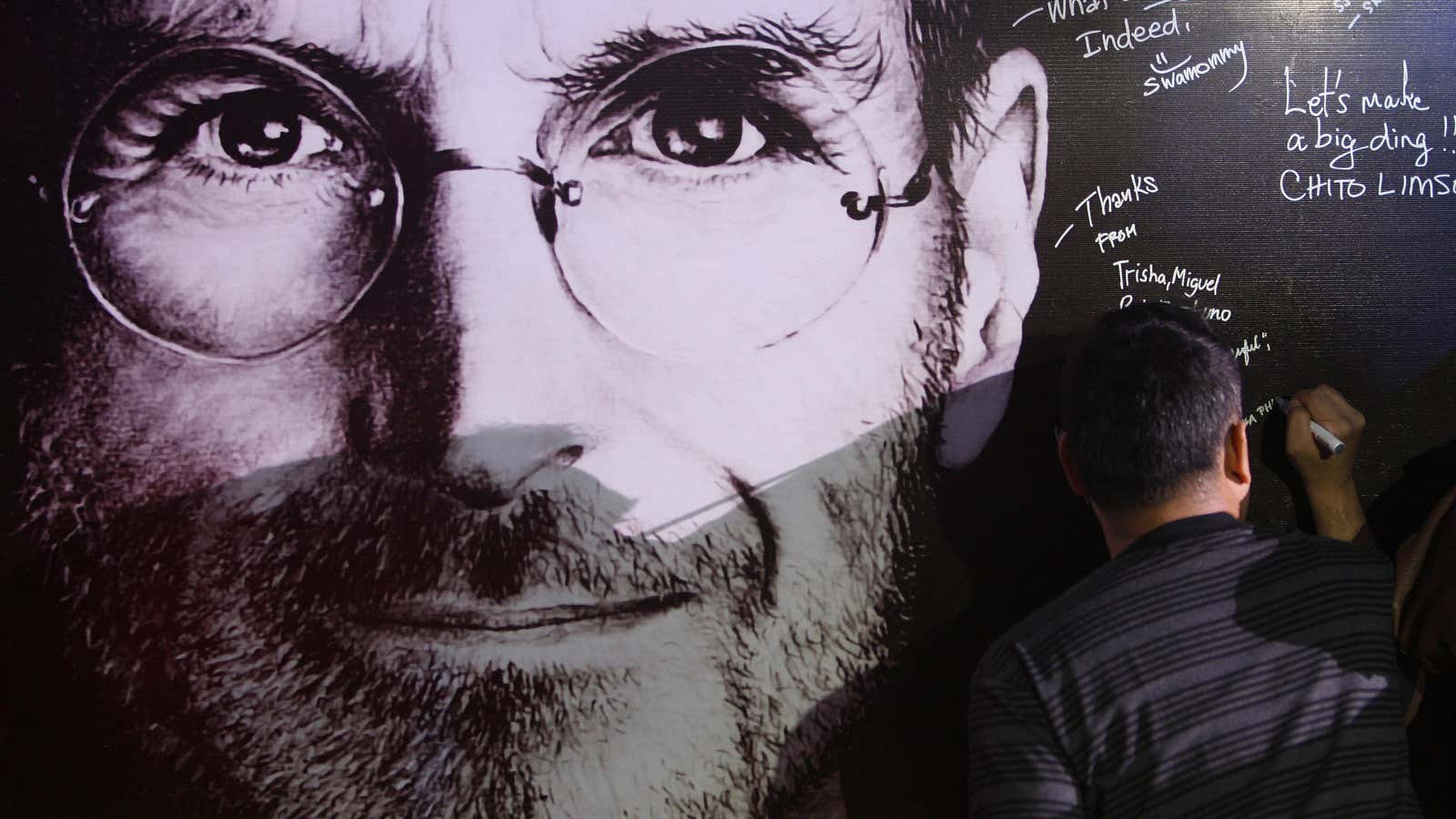“And Tim Cook spaketh, and the word of the Apple God was good.”
Steve Jobs cultivated the eccentric geek guru image to perfection when he built the secular church of Apple and deliberately cast himself as a modern-day Messiah in turtleneck and jeans.
But with his Apple Watch “New Testament,” and aggressive campaign for the quasi-canonization of the late founder, CEO Tim Cook is taking the familiarly creepy cultish characteristics of the world’s largest company by market capitalization to a new, cringe-inducing level of customer-focused religious fervor.
Take a new authorized hagiography of the late Apple founder, out today, with the propagandistic title of Becoming Steve Jobs: The Evolution of a Reckless Upstart into a Visionary Leader.
In this unabashedly flattering account, written with the overenthusiastic participation of Apple’s senior executives and staff, Cook tries a little too hard to rescue and reframe the partially tarred image of his former boss. The man was not “a greedy, selfish and egomaniac,” he says adamantly, and only yelled at him, you know, about four or five times in his life.
In other words he was ‘‘the Steve Jobs you didn’t know: kind, patient and human.’’
Cook, and his crew like Apple chief designer Jony Ive and senior VP Eddy Cue are talking up the new revisionist biography and insisting in tactical unison that the apocryphal gospel of Walter Isaacson is plain heresy (the bestselling 2011 bio Steve Jobs depicted the Apple legend as sometimes tyrannical and bad-tempered and occasionally a jerk).
Corporate revenge is coming in the form of tweets from Cue, who declared: ‘‘Best portrayal is about to be released – Becoming Steve Jobs (book). Well done and first to get it right.’’
Take that, Walter!
There are other fish to fry in the concerted Apple campaign to reclaim the narrative of Jobs’ complicated life and work.
‘‘Very disappointed in SJ:Man in the Machine,’’ Cue tweeted sniffily about the Alex Gibney “warts-‘n-all” Jobs documentary that premiered at SXSW this month. ‘‘An inaccurate and mean-spirited view of my friend. It’s not a reflection of the Steve I knew.’’
There is more at stake here than a management push to defend a friend and former boss whose reputation has been supposedly posthumously sullied.
Conscious of the pressure that the gigantic Apple bubble could burst one day, Cook is a man on a crusade.
The aim is to remake the image of the tech behemoth, marketing-style, by ramping up the well-known Apple penchant to portray its enterprise as a a divine mission. In the post-apocryphal holy book Cook is the freshly anointed charismatic leader pitching for converts to his new covenant Apple Watch wearable device like Cupertino Christ Superstar, accompanied by the Renaissance Madonna-like supermodel Christy Turlington.
The Holy Trinity of the multitrillion-dollar company is now comprised of Jobs The Father, Cook The Son, and Sir Jonathan Ive The Holy Spirit.
The Cook push for the beatification of secular Saint Steve, or more precisely his deification, elevating the former son of God into the equivalent God the father, has taken on the urgency of all cult leaders eager to keep the dream alive after the premature death of the savior.
At the same time Cook is marking out his own spiritual territory with Apple Watch, a device he is hyping as transformative technology and luxury, just like a pastor at a Christian revivalist meeting for the post-Christian tech age.
This is what academic researchers define as the deliberate attempt to upgrade a sect into a bona fide religion that moves beyond the straightforward cult of personality surrounding the founder and morphs into a much broader system of belief and indoctrination.
In the new biography Cook even expands on the theological notion of one body, one flesh, linking himself to Jobs, by giving the startling tidbit that he offered to give a part of his liver to the pancreatic cancer sufferer back in 2009.
Channelling Saint Lucy, laying her gouged-out eyes on a platter in the service of God, Cook took it upon himself to share a core organ with his ailing boss. But being the ultimately selfless guru and unwilling to allow his successor to sacrifice his liver or his health, Jobs angrily turned down the proposal.
As Apple writes its own script of Jobs’ wonderful life, Cook keeps busy highlighting he and his dream team’s superhuman qualities, worship of the new company time piece, and collective veneration of the martyred founder up there in Mac heaven.
Like Jesus, the boastfully ascetic Cook doesn’t need to eat or sleep. He smugly tweeted to his more than 1 million followers on the day of the Apple Watch’s reveal: “Got some extra rest for today’s event. Slept in ’til 4:30.” Is this Cook’s version of Jobs’s alleged “reality distortion field” and will he soon be telling us he can levitate like the great mystics?
Monty Python is no longer around, however their flying circus could have a marvelous time satirizing Apple’s consumer-religious overreach.
The once-almost-counter-culture consumer electronics company is hitting a tipping point in its push to continually spiritualize its mission.
The core business after all remains flogging nicely designed personal tech gadgets and devices. It’s huge in consumption, business, and lifestyle terms but it is not religion. And Apple Pay is hardly the stuff of revolutions.
